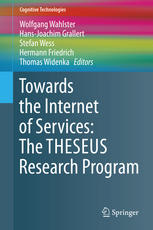

Most ebook files are in PDF format, so you can easily read them using various software such as Foxit Reader or directly on the Google Chrome browser.
Some ebook files are released by publishers in other formats such as .awz, .mobi, .epub, .fb2, etc. You may need to install specific software to read these formats on mobile/PC, such as Calibre.
Please read the tutorial at this link: https://ebookbell.com/faq
We offer FREE conversion to the popular formats you request; however, this may take some time. Therefore, right after payment, please email us, and we will try to provide the service as quickly as possible.
For some exceptional file formats or broken links (if any), please refrain from opening any disputes. Instead, email us first, and we will try to assist within a maximum of 6 hours.
EbookBell Team

4.7
96 reviewsThe Internet of Services and the Internet of Things are major building blocks of the Future Internet. The digital enterprise of the future is based not only on mobile, social, and cloud technologies, but also on semantic technologies and the future Internet of Everything. Semantic technologies now enable mass customization for the delivery of goods and services that meet individual customer needs and tastes with near mass production efficiency and reliability. This is creating a competitive advantage in the industrial economy, the service economy, and the emerging data economy, leading to smart products, smart services, and smart data, all adaptable to specific tasks, locations, situations, and contexts of smart spaces. Such technologies allow us to describe, revise, and adapt the characteristics, functions, processes, and usage patterns of customization targets on the basis of machine-understandable content representation that enables automated processing and information sharing between human and software agents.
This book explains the principal achievements of the Theseus research program, one of the central programs in the German government's Digital 2015 initiative and its High-Tech Strategy 2020. The methods, toolsets, and standards for semantic technologies developed during this program form a solid basis for the fourth industrial revolution (Industrie 4.0), the hybrid service economy, and the transformation of big data into useful smart data for the emerging data economy.
The contributing authors are leading scientists and engineers, representing world-class academic and industrial research teams, and the ideas, technologies, and representative use cases they describe in the book derive from results in multidisciplinary fields, such as the Internet of Services; the Semantic Web, and semantic technologies, knowledge management, and search; user interfaces, multimodal interaction, and visualization; machine learning and data mining; and business process support, manufacturing, automation, medical systems, and integrated service engineering.
The book will be of value to both researchers and practitioners in these domains.